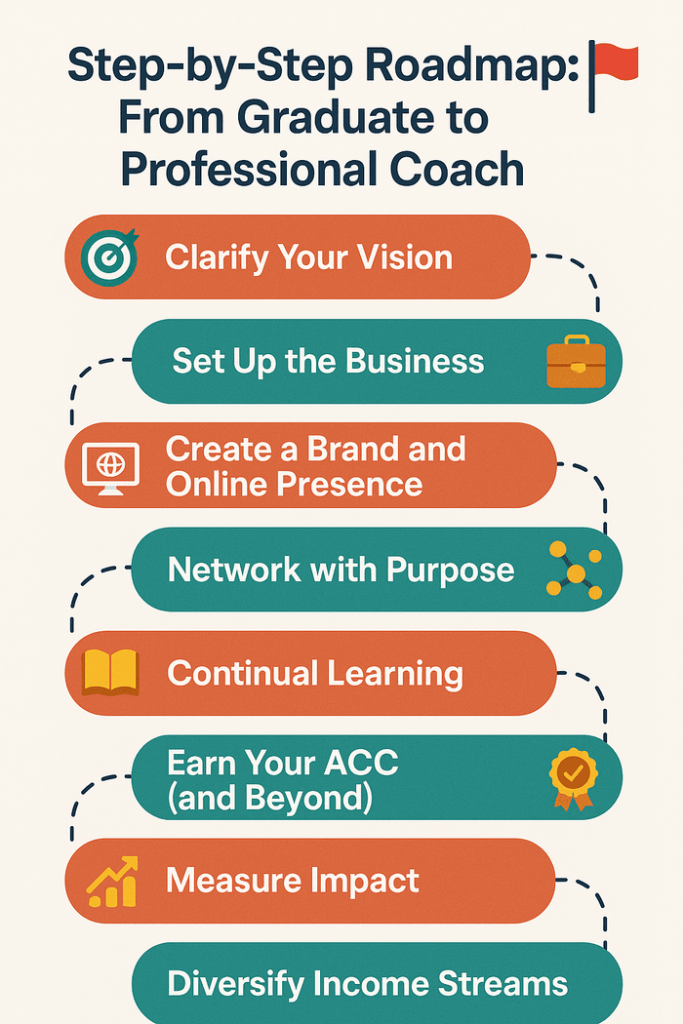
When searching for a certified life coach program price, it’s natural to start by comparing tuition fees. Aspiring coaches want...
Completing The Art & Science of Coaching is a huge milestone. Erickson Coaching International’s flagship programme is a globally recognised gold standard for life, executive and professional coaching certification. It equips you with a solution‑focused methodology rooted in neuroscience and system thinking, and connects you to a community of over 55,000 alumni across more than 130 countries. Yet many new coaches finish this transformational journey with a burning question: What comes next? This long‑form guide unpacks the diverse career pathways, specialisations and business opportunities available to you as a graduate in India and around the world. We’ll cover practical steps for building your practice, earning credentials, deepening your skills and making a meaningful impact.

The Art & Science of Coaching comprises Level 1 and Level 2 modules, totalling 64 to 128 hours of training depending on your pathway. The programme is accredited by the International Coaching Federation (ICF), which means it meets the gold‑standard requirements for coach education. Graduates can apply for the Associate Certified Coach (ACC) credential after completing coaching experience and mentor coaching. According to the ICF Global Coaching Study, the number of credentialed coaches has skyrocketed from 200 in 1999 to 49,603 by January 2023. This dramatic growth reflects both the increasing demand for professional coaching and the importance of formal credentials in today’s competitive marketplace.
Certification signals to potential clients and employers that you adhere to internationally recognised standards of competence and ethics. In a world where trust is paramount, completing an ICF‑accredited programme is no longer a luxury—it’s a necessity. With more than 1000 coaching programmes on the market, having the ICF stamp of approval helps you stand out and assures clients of the quality of your training. Erickson’s curriculum emphasises future and solutions focus, holistic and systemic thinking, resource activation and action with accountability—skills that are in high demand across industries.
Graduates of The Art & Science of Coaching pursue a variety of paths. Some build independent practices, others integrate coaching into existing corporate roles, and many specialise in niche areas like leadership or wellness. Below is a high‑level map of the possibilities.
Career Path | Description | Typical Next Steps | Pros & Considerations |
|---|---|---|---|
Independent Life/Executive Coach | Launch your own coaching practice focused on individuals or executives. | Register a business, define niche, set pricing, build client acquisition strategy, develop marketing plan. | Full autonomy and earning potential; requires entrepreneurial mindset and self‑marketing. |
Internal Coach in Corporate/NGO | Work within an organisation to coach employees and leaders. | Apply to HR, L&D or leadership development roles; leverage your credentials and Erickson network. | Steady income, benefits and built‑in clientele; may need to balance coaching with other responsibilities. |
Specialised Niche Coach | Focus on areas like career transitions, wellness, relationship, neurodiversity or team coaching. | Pursue additional certificates (e.g., NLP Practitioner, team coaching); collaborate with mentors. | Deep expertise attracts specific clients; must align with market demand. |
Trainer or Mentor Coach | Teach future coaches or mentor for ICF credentials. | Gain advanced credentials (PCC or MCC); accumulate mentoring hours; join coach training organisations. | Opportunity to shape the next generation of coaches; requires mastery and teaching skills. |
Hybrid Consultant/Facilitator | Combine coaching with consulting, facilitation, or training services. | Build expertise in organisational development or facilitation frameworks (e.g., Agile, Design Thinking). | Diversified income streams and broader impact; requires adaptability and additional learning. |
While The Art & Science of Coaching prepares you for the ACC credential, many graduates aspire to higher levels: the Professional Certified Coach (PCC) and Master Certified Coach (MCC). Achieving these credentials requires additional client coaching hours, mentor coaching and demonstration of competencies. As you build your practice, track your hours, collect feedback and maintain reflective journals. Each credential level brings greater credibility and allows you to command higher fees.

Executives face pressure to lead through complexity, remote teams and market disruption. Erickson’s solution‑focused approach helps leaders focus on desired outcomes rather than dwelling on problems. Many graduates specialise in leadership coaching, guiding managers to develop emotional intelligence, visioning skills and high‑performing teams. This niche often commands higher fees and can be delivered within organisations or through independent consultancy.
India’s workforce is experiencing rapid change as technology reshapes industries and young professionals seek purpose. Coaching graduates can support clients in clarifying career goals, navigating transitions and building personal brands. Erickson India’s programmes emphasise action and accountability, which are crucial in career coaching. Graduates often partner with universities, HR departments or professional associations to reach clients.
Wellness coaching addresses stress management, mindfulness and work‑life balance. With rising mental health awareness, this niche is growing. Coaches integrate Erickson’s resource activation and systemic thinking to help clients design sustainable wellness plans. You can also blend life coaching with other modalities like somatic therapy, nutrition or yoga, provided you obtain appropriate certifications.
As organisations embrace collaboration, team coaching is in demand. Erickson offers a Team Coaching Certification focusing on group dynamics, psychological safety and systems thinking. This niche allows coaches to work with entire teams, aligning individual and collective goals. It also complements other roles, such as organisational development consultant or agile coach.
Entrepreneurs and creatives often battle self‑doubt, time management issues and visioning challenges. A coach trained in solution‑focused techniques can help them set clear goals and maintain accountability. You might specialise in startup founders, artists, or freelancers. Combining coaching with business mentoring can attract a broader client base.
Many Erickson graduates remain in their original professions but apply coaching skills to enhance performance. HR professionals use coaching to design development programmes; educators bring solution‑focused conversations into classrooms; healthcare providers use coaching to improve patient engagement. Even software engineers and consultants integrate coaching tools to facilitate teamwork and innovation. By adding coaching to your existing role, you become a catalyst for transformation within your organisation.
Why should clients choose you? Define your unique selling proposition: your niche, approach, values and success stories. Craft concise messages that resonate with your target audience. For example, “I help mid‑career professionals in Bangalore transition into meaningful work using solution‑focused coaching.”
Write articles, host webinars, speak on panels and appear on podcasts. Share insights on topics like goal‑setting, leadership, or work‑life balance. Use data from the coaching industry to build credibility—highlight that coaching has a 3.44× average financial return for individuals who profit from coaching and that 86% of companies recoup their investment in coaching.
Satisfied clients are your best marketers. Ask for testimonials and referrals. Offer referral incentives or create a small ambassadors’ programme where past clients earn discounts for successful introductions. Erickson’s global alumni network is a valuable source of collaboration and cross‑referrals.
Optimise your website content with keywords like life coach India, executive coaching Bangalore or solution‑focused coach. Share regular content on LinkedIn and Instagram. Highlight success stories, case studies and insights from neuroscience or positive psychology. Post videos where you answer common questions and invite followers to book discovery sessions.
Pricing is both art and science. Research your market—what do coaches with similar credentials in India charge? Price your services based on your expertise, niche, client income levels and the value you deliver. Consider offering:
Remember to factor in preparation time, administrative work and taxes when setting rates. Many coaches start at a moderate price to build testimonials, then incrementally increase fees as demand grows.
Even after an intensive training programme, new coaches can struggle with self‑doubt. Recognise this as part of growth. Use the same techniques you will teach clients—mindfulness, reframing and anchoring—to stay grounded. Remember that confidence grows through practise. Seek supervision and mentorship from Erickson faculty or experienced coaches.
Initially attracting clients can feel daunting. In addition to networking and marketing, offer pro bono or discounted sessions to build experience and testimonials. Partnerships with organisations, schools or community groups can provide access to clients. Consider joining coaching directories or platforms that match coaches with clients.
Running a coaching practice requires managing finances, scheduling, marketing and compliance. Invest in tools (scheduling software, accounting apps, secure video platforms) and consider hiring a virtual assistant. Learn about data privacy laws and ethical guidelines—especially if you use AI or digital tools—by reviewing the ICF’s 2025 Code of Ethics.
Divya, an HR manager at a technology firm in Delhi, felt drawn to coaching after witnessing the power of solution‑focused conversations. She enrolled in The Art & Science of Coaching in 2023, balancing evening classes with work. During the programme, she discovered a passion for leadership coaching and began offering sessions to colleagues. Within six months, Divya completed her practicum hours and applied for the ACC credential. She then left her job to launch her practice. By tapping into Erickson’s alumni network, she found mentors who guided her through pricing, marketing and niche definition. Within a year, Divya secured corporate contracts with two mid‑sized companies. Her ACC credential signalled professionalism, and her clients appreciated her systemic perspective. Divya now coaches senior leaders on communication, team dynamics and strategic visioning. She continues her journey toward PCC, investing in continuous learning and exploring team coaching certifications.
The coaching industry is booming. The number of practicing life coaches has exploded to more than 49,000 credentialed coaches worldwide, and the market is projected to continue growing. Emerging trends include:
Completing The Art & Science of Coaching is just the beginning of a rewarding journey. With a solid foundation in solution‑focused methodology, neuroscience and systemic thinking, you are prepared to transform lives and organisations. Your career path might lead you to independent practice, corporate roles or specialised niches. Whatever direction you choose, remember that the coaching profession thrives on continuous learning, ethical practice and authentic connection. By leveraging your certification, tapping into Erickson’s global community and embracing innovation, you can build a fulfilling career that positively impacts individuals and society. The world needs skilled coaches—your next chapter starts now.
Graduates can pursue independent life/executive coaching, internal corporate/NGO coaching, specialized niche coaching (e.g., leadership, wellness), trainer/mentor roles, or hybrid consultant/facilitator positions. Each path leverages Erickson’s solution-focused methodology and offers unique opportunities and challenges.
The Art & Science of Coaching (64–128 hours) is ICF-accredited, qualifying graduates for the Associate Certified Coach (ACC) credential with 100 coaching hours and mentor coaching. It also sets the foundation for Professional Certified Coach (PCC) and Master Certified Coach (MCC) credentials with additional hours and experience.
Clarify your niche, register your business, create a brand and online presence, network through Erickson’s global alumni, pursue continuous learning, earn ICF credentials, measure client impact, and diversify income through group coaching or workshops.
Popular niches include leadership/executive coaching, career/transition coaching, wellness/life coaching, team/group coaching, and coaching for creatives/entrepreneurs. Each aligns with Erickson’s focus on solutions, systemic thinking, and resource activation.
Combat imposter syndrome with mindfulness, NLP techniques (e.g., anchoring, reframing), and supervision. For client acquisition, offer pro bono sessions, leverage testimonials, partner with organizations, and optimize online marketing with SEO and social media strategies.

When searching for a certified life coach program price, it’s natural to start by comparing tuition fees. Aspiring coaches want...

Neuro-Linguistic Programming (NLP) is experiencing a resurgence in India. Social media, workshops and high-energy seminars promise instant breakthroughs by rewiring...

Many professionals pursue the title of Certified Organizational Development Coach with the expectation that a credential alone will open corporate...

Some providers offer to fast-track you to PCC status through purely online modules for a fraction of the cost of...

Executive coaching has evolved from a niche service for struggling leaders into a strategic investment for organisations aiming to build...

When prospective coaches research training options, cost is often the first number they look for. A quick internet search produces...

Deciding to invest in life coach training programmes can be a transformative milestone in your personal and professional journey. In...

Choosing the right online life coaching courses can be one of the most transformative decisions you ever make.

The demand for personal and professional growth has never been higher. As more people seek guidance on careers, relationships and...